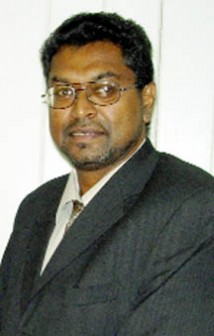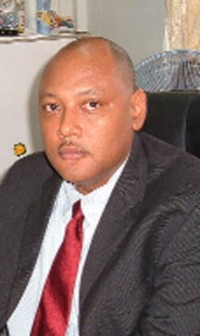-but financial independence is key, says Ramjattan
The opposition is in favour of a full-time legal office for the National Assembly to offer legislative drafting assistance to parliamentarians and to advise the Speaker and Clerk, but AFC leader Khemraj Ramjattan believes that the parliament’s financial independence is essential to making it a reality.
With APNU and the AFC holding a one-seat majority in the House, enabling them to pass legislation without the support of the ruling party, the issue of legislative drafting has been identified as critical, particularly in light of the specialised training needed because of the highly technical nature of laws.
Last week, Speaker Raphael Trotman said that the government “is going to give its consent” for the establishment of a legislative department to assist both sides of the National Assembly in drafting bills, and that it is expected to be set up before the end of the year.

“The National Assembly needs to have its own drafting office. It needs to have a legal office, a full time legal office,” APNU Vice-Chairman Dr Rupert Roopnaraine told Stabroek News, even as he pointed to the situation at last week’ sitting, where Trotman had to seek legal advice after the opposition objected to Minister of Home Affairs, Clement Rohee tabling a Bill because the House had approved a no-confidence motion against the minister. A legal office would offer advice to the Speaker and Clerk and would also offer assistance to parliamentarians in drafting legislation, Roopnaraine said. He noted that even the Attorney-General’s Chambers is having a difficult time keeping up with drafting government bills.
APNU leader David Granger said that the government has the advantage in terms of expertise on matters such as legislation and budgetary matters and there is the need for that sort of expertise to be made available to other parties to enable them to critically examine issues relating to these when they arise. He noted that there is a parliamentary counsel but the opposition will not have unrestricted access and there is a need to set up a mechanism whereby the opposition can get assistance for its work. He also noted the need for an Office of the Budget which can assist the parliamentarians in examining and dealing with budgetary matters as they arise.
AFC leader Khemraj Ramjattan has also agreed that there is a need for legislation drafting help but expressed concern that a legal office for parliament would not be supported by the government. He said that in this situation, the financial independence of parliament must be realized if such a facility is to be become a reality.
Ramjattan pointed out that it is difficult to craft legislation and cited the AFC’s Whistleblower Bill, which is currently being drafted. The draftsperson has to know the history, the Constitution as well as whether the provisions of the Bill will collide with any existing laws, he said. “It is a massive piece of research.” With regards to the AFC’s Telecommunications Bill, he noted that it piggybacks on the government’s Bill with many provisions being similar. It takes huge resources to formulate a Bill, he stressed, while adding that it is a delicate process. “You have to write the provisions very, very carefully,” he said.

A United Nations Development Programme (UNDP)-funded workshop to furnish parliamentarians with the insights and strengthen their capacity to draft and amend legislation concluded last week but this is not enough, Roopnaraine said. At the workshop, Attorney General and Minister of Legal Affairs Anil Nandlall said that the legislative drafters in his Ministry are for the Government only even though he said the administration is supportive of the training programme to train MPs and Parliament staff in legislative drafting.
Two weeks ago, Trotman announced that he would be seeking to hire experts to draft legislation for the opposition, and he is also seeking guidance on the enforcement of motions that have been passed. “I have received tacit support for legal counsel to be hired by the National Assembly to assist with drafting and interpretation,” he had said, adding that while he himself is a lawyer and that there are many lawyers on the opposition benches, it will be a bad idea to rely on their interpretation hence the need for experts. His comments come in wake of Granger saying that the opposition parties were seeking external assistance in drafting legislation to bring to the National Assembly, in light of the Attorney General making it clear that his office would not be providing assistance.
Reiterating the need for a full time legal office for the National Assembly, Roopnaraine said that they will be pushing for this. “It is building that institution that is going to be the real challenge,” he added.
In the meantime, the APNU chairman said that the coalition’s legislation is being drafted by its lawyers but they have also sought expertise from outside the party since drafting laws is a highly technical, specialized field. The AFC is also utilizing its own people. “We need to develop our own capacity,” Roopnaraine said.





